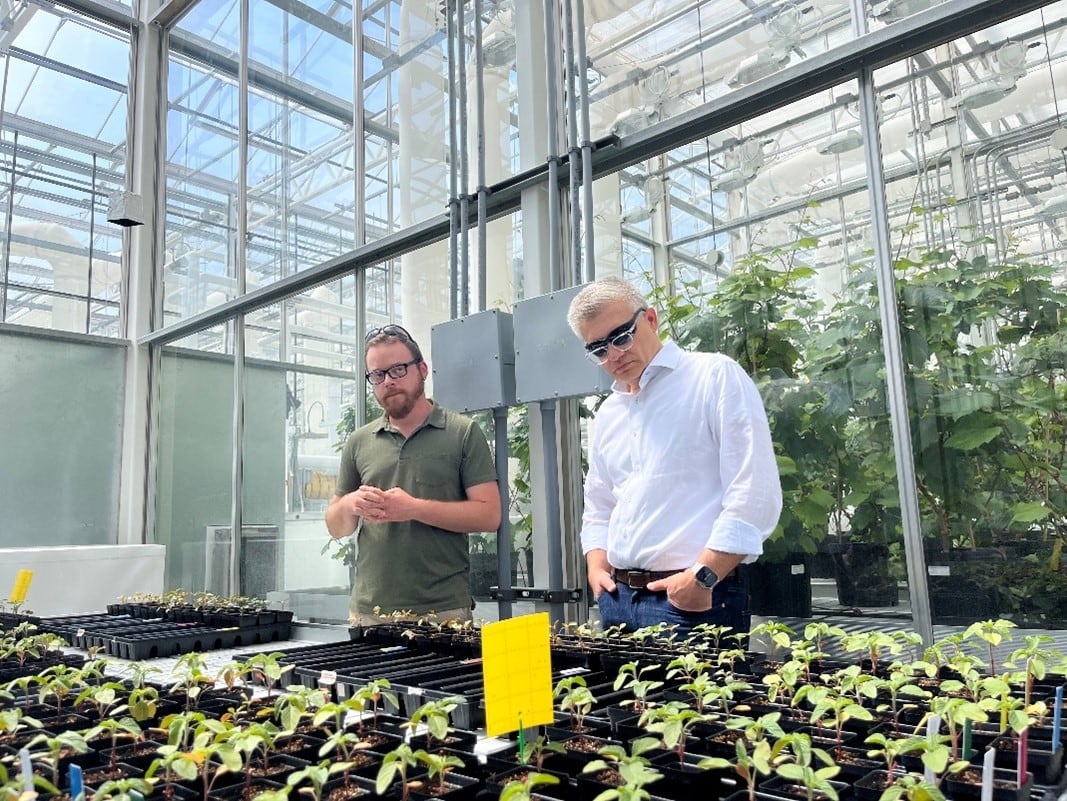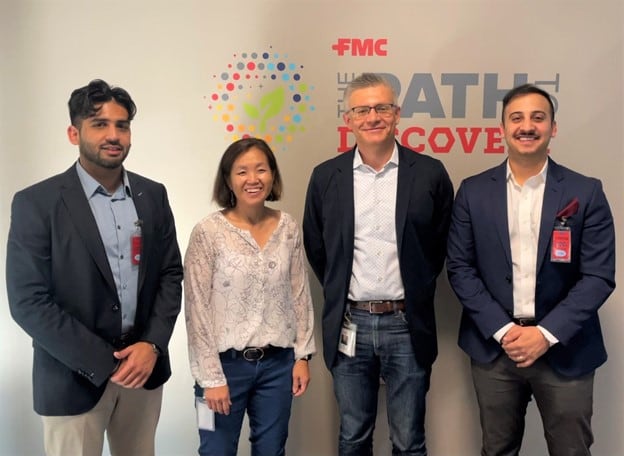ATN: What’s the primary mission of FMC Ventures?
MF: We believe that the future of crop protection will look a lot different within our lifetimes due to climate change, regulatory pressure, pest resistance issues, labour shortages, soil quality and health, among other dynamics. FMC Ventures began in 2020 as FMC’s corporate venture capital arm. Its mandate has remained the same since – find game changers in crop protection. These are the companies that we believe may have an outsised role in reimagining the future of the industry and maybe even FMC itself.
We are driven primarily by strategic value – learning, access to new knowledge and capabilities, and influence with select start-ups. While we want to invest beyond the core of FMC, it has to still be relevant for the company and industry.
If we make the business a bit uncomfortable, then we’re doing it right. We do not invest with the intent to acquire them, but it always remains an option. To date, we have made nine direct investments with one exit (BioPhero to FMC in 2022).
We are looking at start-ups that we believe will have an outsized role in defining the future of the sector. This may include precision ag, formulation and delivery, biologicals, agrifintech, soil health, and more. Anything that would help a farmer be more profitable, sustainable, and has something to do with crop protection is in scope for FMC Ventures.
ATN: What are some examples of companies in FMC Ventures' portfolio?
MF: AgroSpheres is a recent investment, which has created a novel, biodegradable encapsulation technology. This is an important element of delivering biological crop protection materials to where they need to go to be effective. Another example is Micropep, a peptide discovery company for weed and pathogen control.
ATN: How does FMC Ventures' investment strategy differ from other venture capital firms?
MF: Most venture capital firms are focused on financial returns. While important for us too, we are primarily driven by strategic returns. In contrast to other corporate venture capital funds, FMC Ventures does not require a business collaboration in order to invest. This enables us to look well beyond our core today. We also prefer early-stage companies – Seed, Series A, Series B stage.
ATN: Can you tell us more about where you see growth potential and why?
MF: Agri-fintech has tremendous growth potential because of the need for growers/distributors credit in accessing inputs and liquidity for offtakes. Agrifintech start-ups are also very capital efficient and can iterate rapidly, which makes them attractive venture capital investments. Biologicals are also poised for growth as we face growing regulatory pressures on synthetics and pest resistance issues. While biologicals start-ups are a bit slower to iterate, the ability of generative AI and machine learning to accelerate discovery is exciting and potentially game changing. There are other sectors with agtech, but these two are poised for the most growth and impact.
ATN: What else do you look for in the companies you invest in?
MF: Investing in startups is risky. Risk typically falls into three main buckets: execution risk, technology risk, financial risk. There are many reasons to not deploy capital. To be venturable, we look at several factors… Talent: narrative, vision, and bias towards action. Market: size, growth, competition. Technology/IP: defensibility, uniqueness. Go to market and fit: how the start-up plans to sell and make money. Financials: fiscal efficiency, assumptions behind their projections. Deal economics: exit potential, syndicate, valuation.
Finally, because we are a strategic investor, we also look at the potential strategic value to FMC – e.g., what we might learn.

ATN: So what have you learned? Do you have examples of how the emerging technologies you spot can complement and transform FMC’s core business?
MF: FMC is fundamentally a crop science company with world-class R&D capabilities. But we know that some transformative innovations will come from the outside. FMC has, or previously had, a collaboration with every one of our portfolio companies. Some of those collaborations continue to this day, complementing the existing capabilities of FMC.
For example, FMC has been working with Micropep for a couple of years on bioherbicides and biofungicides. We know that synthetic chemistry will always play a role in crop protection, but we must have new modes of action that are biodegradable and sustainable. Peptides may be the unlock needed. The collaboration has yielded a more informed view of the modes of action that peptides can provide.
ATN: How do you build working relationships with founders?
MF: Regardless of whether we invest in a start-up, FMC Ventures is a conduit into FMC. For portfolio companies, we act as a bridge between the founders and R&D or business units. We don’t get involved in day-to-day collaboration work but can be of help to either side if friction occurs. We are also active participants in the board room, where we provide feedback and guidance just as other board members do.
Because of our industry expertise combined with venture capital expertise, we provide a unique value viewpoint on the board. For founders in which we do not invest, we can still help with connections to appropriate FMC teams, other investors, and general guidance on the industry.
ATN: How do you define success?
MF: We think long term. Success for FMC Ventures is strategic value to FMC, which may take 3-10 years to realize. This can come in the form of access to new capabilities, new markets, ability to do something with a startup that we could not do otherwise, a clearer view of the future in crop protection, and of course growth of our portfolio companies.
ATN: What’s your advice for start-ups amid the current downturn in VC spend?
MF: Extend your runway as much as possible and only spend what you must to meet your milestones. Let the market price your company and don’t be surprised if it’s lower than you expect. Finally, seek capital from ag-adjacent funds like climateTech or impact funds. These types of funds are becoming increasingly active in Agtech.
ATN: What’s exciting you/scaring you the most in the agtech world?
MF: What’s exciting and scary, I think, are synonymous in this context. Climate change, labour, and shifting pest pressures are some of the most existential risks to agricultural production and food security. Without innovation, the human species is in trouble. The ingenuity and vision of entrepreneurs who are solving these problems is inspiring and inspirational. FMC Ventures is proud to be part of shaping the future together.
ATN: What do you think is key to ensuring these solutions are adopted by the people who use them on the ground so that we see real impact?
MF: There are several points of disconnect: A) information silos persist throughout the ag and food value chain. A lot of data are generated at each step, but much of it is not interoperable with the next step. So a lot of information gets lost or diluted, including data that may help subsequent steps be more efficient.
B) too often, when I ask an entrepreneur if they’ve discussed their prototype with a user or farmer, they say no.
C) I often hear founders say they can grow their business without the Big Ag input companies or ABCDs. These players can be a gateway for distribution, co-formulation in the case of crop protection, or joint R&D.
D) Finally, no one in the value chain will adopt a start-up’s solution if the costs are too high. Especially farmers, whose margins are quite thin already. Any new product or technology has to be as cheap as what they use today, or save them time and labour expenses, and more effective. This last concept sometimes creates a disconnect with founders and investors alike.





